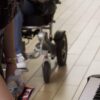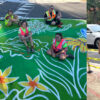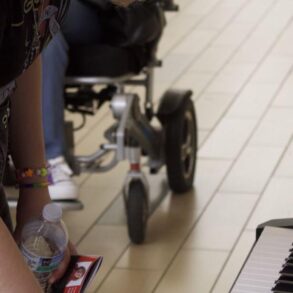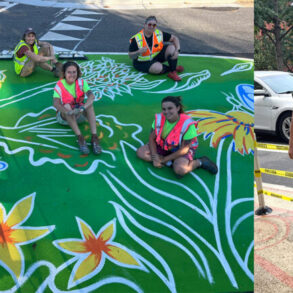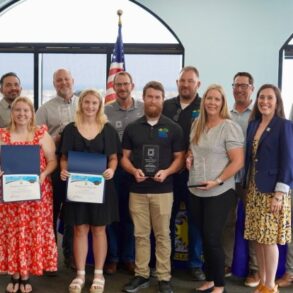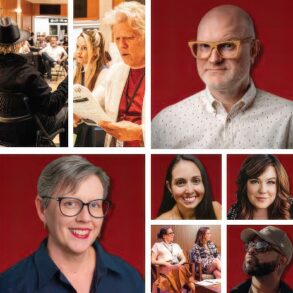Art Basel gives Miami another excuse to party
Chloé Pantazi-Wolber/Business Insider
- I visited Art Basel Miami Beach as it turned 21 this year.
- The world-famous fair is as much about being seen as it is seeing the art.
- What started as an event for galleries and collectors has since become a week-long, citywide party.
The traffic is a nightmare.
I’m sitting in the back of an Uber on my way to dinner in Wynwood, anxiously refreshing Google Maps to monitor the traffic ahead.
But it’s Thursday night during Miami Art Week, so what should be a 20-minute drive from South Beach takes close to two hours.
I’m in town for my first Art Basel, even though at this point I haven’t yet seen a piece of art besides a print in my hotel lobby. I learn quickly that the chaos isn’t confined to the Miami Beach Convention Center, where the world-famous annual festival is being held from December 8-10. The whole city is in party mode.
Leading up to the fair, invites to events around Miami pour into my inbox: brunches; cocktail hours; celebrity apparel pop-ups at hotels; art installations at design houses like Fendi. It’s not clear if these functions are all related to the actual art festival, but that doesn’t seem to matter.
My first event is the opening party for The Art of Hip-Hop’s permanent space at Wynwood’s Museum of Graffiti, kicking off with its first exhibit, “From the Bronx to the Beach.”
We’re greeted by a wall of boomboxes — an instant photo op. Then, there’s the exhibit itself, an ode to hip-hop through album art, photography, and fashion. Guests in sequin boots, cutout dresses, and sheer looks meander through the displays, pausing to admire portraits of artists from Drake to Pitbull, or Henry Chalfant’s photos of graffiti-covered subway trains in 1970s New York City.
Chloé Pantazi-Wolber/Business Insider
Later on, LA Clippers point guard John Wall and rapper Fat Joe appear, the latter of whom performs out back where guests dance in front of a butterfly mural.
Next, I go to Gramps, a Wynwood bar known for its drag shows. As I sip on a Rosemary’s Baby cocktail, the Miami-famous drag queen Karla Croqueta declares that tonight’s show is dedicated to Art Basel. “Thank you, Art Basel,” Croqueta says, with more than a hint of sarcasm, before introducing the next act who lights up the stage performing Nicki Minaj’s “Moment for Life” in a purple and Barbie-pink catsuit.
I realize I’m watching some of the best performance art in town.
At 21, Art Basel lives to party
This year’s art fair marks its 21st year in Miami Beach. The prestigious festival originated in Basel, Switzerland, in 1970, where it continues to be held each spring, and eventually expanded into the US market with Miami in 2002. The fair is also held annually in Hong Kong and Paris.
But what started as Miami’s edition of the art fair — meant to bring together the art world’s major players — has since become a week-long, citywide party.
Chloé Pantazi-Wolber/Business Insider
I worry I’ve come too late, arriving in the middle of the week, but am assured by a Miami resident that all the good parties are on Thursday and Friday. When I tell Miami locals I want to go to the convention center, they’re confused — go once if you want to, they say, but it’s not really the point anymore.
They seem to be right. As I brush shoulders with influencers, publicists, and business moguls at functions filled with cocktails and canapes, I wonder where the artists are.
The actual fair means business
When I finally get to the convention center, I’m swept up in its grandness.
Inside the cavernous hall, people funnel through several entrances to the festival floor and linger around the various shops and attractions in the lobby. Before I enter, a display of Louis Vuitton purses designed with the architect Frank Gehry, catches my eye. A retail associate tells me casually the items range from $11,400 to $36,500. Welcome to Art Basel.
On the main floor, I’m surprised to see something I recognize almost immediately: a large flower sculpture covered in oversized dots — Yayoi Kusama’s 2018 piece, “Flowers That Speak All About My Heart Given to the Sky.” A couple poses for a photo in front of the piece with their toddler, who is fascinated by the sculpture. I spot a number of fairgoers with their kids, which I didn’t expect, but there’s certainly enough to keep them entertained with 277 galleries bursting with often colorful art.
I know it’ll be impossible to see everything, so I plan to zigzag through the galleries like I would aisles at the grocery store, but that doesn’t quite work. Inevitably, something catches my eye and I turn a corner and find myself lost in the maze that is Art Basel. Consulting my floor map, I circle the key galleries I’d read about, determined to at least see what the art world is talking about.
One piece stays with me: Seung-taek Lee’s “Earth Play,” an imposing, partially deflated balloon painted to look like the world. The structure is impossible to miss and makes a statement about the fragility of our planet as it sits on the floor, patched with small bits of tape covering up punctures and dents.
The piece isn’t perfect — and that’s the point. I read on nearby placards that the Korean artist has spent years toting the piece, from the 1990s, around the world for performances.
In some of the art, I search for meaning but soon give up. A beating drum hanging upside-down from the ceiling. An ASMR video of two women clapping their hands on their cheeks. A handbag with long legs. And the most perplexing: a pile of Amazon boxes on the floor. If this is art, it turns out I’ve been a collector all this time.
Chloé Pantazi-Wolber/Business Insider
I don’t see many new political pieces, besides Julie Buffalohead’s “Our Bodies Our Choice,” an almost 20-foot-wide painting that seems to respond to the abortion bans that have popped up across the country.
And while I don’t come across any art acknowledging the Israel-Hamas war, the conflict looms over the festival, which cancels an outdoor art walk due to a protest.
EVA MARIE UZCATEGUI/AFP via Getty Images
The festival isn’t just about art
In most cases, the attendees of Art Basel are just as interesting as the art.
There’s a fairgoer in a pastel fur-style coat who matches the colors of a portrait she’s admiring. A Gen Z group poses for a selfie in a reflective sculptural piece. And a gallery staffer consults a couple about a piece of art that I struggle to understand.
Chloé Pantazi-Wolber/Business Insider
I leave the convention center overwhelmed. Days later, I think back to a certain piece and wonder if there’s something I missed. I’m aware that my Art Basel experience as a journalist, some outside observer, isn’t the same as others who attended the festival to do very different work.
At the airport heading home, a woman on the phone tells someone that Art Basel was a success. I assume she’s a collector, but find out she’s an interior designer who picked up a few millions’ worth of pieces for her clients. (That’s a lot of money, but it’s just a fraction of the cost of the fair’s top-selling piece: Philip Guston’s “Painter at Night,” which went for a reported $20 million.)
I’m reminded that while Miami throws a big party when Art Basel comes to town, it’s also a business meeting and an expensive market. There just happens to be an art fair going on at the same time.
This post was originally published on this site be sure to check out more of their content

